Is opposition to genetically modified food irrational?
- Published
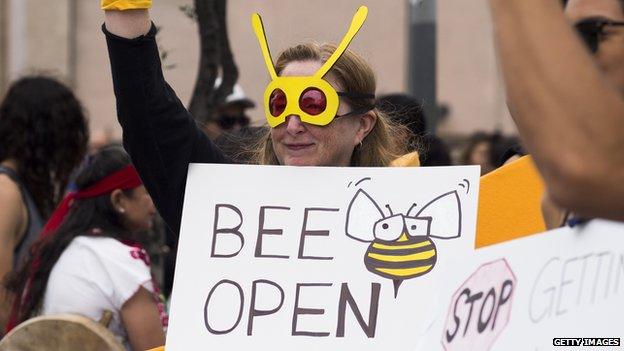
Last month activists took part in co-ordinated protests against GM across the globe
On Saturday 23 May 2015, thousands of activists gathered across the world to demonstrate against genetically-modified (GM) seeds and foods., external There were protests in cities including Los Angeles, Paris, Santiago and Ouagadougou, the capital of Burkina Faso.
Yet the majority of scientists argue that GM food is safe. A recent poll from the Pew Foundation, external found that almost 90% of scientists from America's largest science body think GM food is generally safe, while only 37% of the public agree.
Should we embrace technology that could help feed the world, or are concerns about the impact of global agribusiness and industrial food production justified?
Four experts spoke to the BBC World Service Inquiry programme.

Pamela Ronald: Humans have modified crops for thousands of years
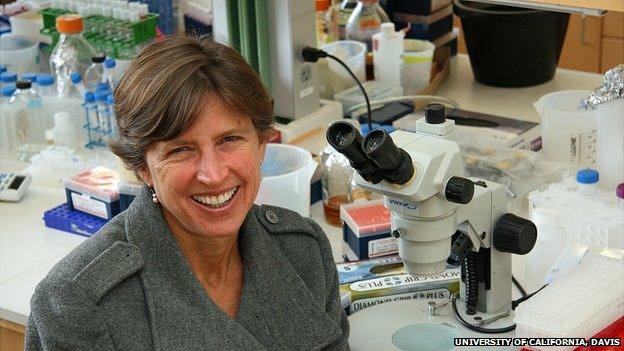
Pamela Ronald runs the Lab for Crop Genetics Innovation at the University of California, Davis. Her team won an award for its decade-long work to isolate the gene that makes rice tolerant to floods.
"Everything we eat has been genetically improved or modified in some manner: 8,000 to 10,000 years ago our ancestors took corn mutants and crossed these to develop different types of corn varieties so they could harvest them better."
The ancient Greeks wrote about grafting - attaching the stem of one plant to the roots of another. The specific skills of modern genetic engineering were developed in California 40 years ago.
"That allows genes from any species to be moved into other types of organisms. For example, insulin was the first genetically-engineered medicine, and it's been very useful because insulin used to have to be harvested from animals, but now human insulin can be produced in microbes and used by diabetics.
"Eggplant is a very important crop in Bangladesh, and there is an insect that can devastate the crop. Farmers spray insecticides two to three times a week, sometimes twice a day, [often] using insecticides that are banned in the United States."
This is where BT comes in - a gene from a soil bacterium which produces a protein that is deadly to pests:
"Scientists cut the gene for BT out of the bacteria and inserted it directly into the eggplant genome. It's been very successful.
"Last season, eggplant farmers reported they were able to reduce their chemical sprays by a huge amount, often down to zero."
"After 40 years of commercial use in medicine, cheeses, wine and plants - and after over 20 years of careful study and rigorous peer review by thousands of independent scientists not funded by major corporations - every major scientific organisation in the world has concluded that the genetically-engineered crops currently on the market are safe to eat.
"Discussion about plant genetics is a complete distraction from the goals of sustainable agriculture. We need to stay focused on how farmers and rural communities can thrive, we must be sure everyone can afford the food, and we must minimise environmental degradation.
"I wouldn't use the word 'irrational' [to describe opposition to GM], I would say it's 'non-science based'."

David Ropeik: We are not rational about risk
Risk perception consultant David Ropeik has worked with governments and GM producers.
"I would disabuse people of proposing that we be rational about this. We think we're rational, objective, post-enlightenment 'we can figure everything out with science' thinkers.
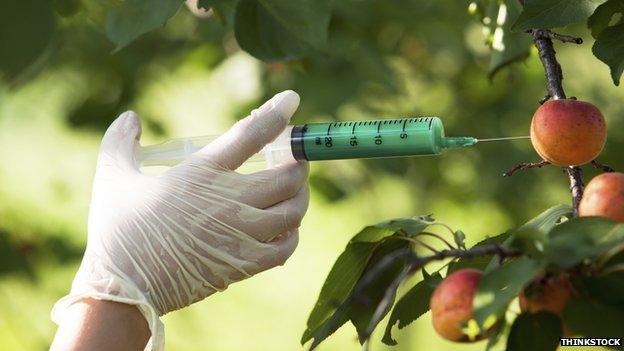
Research suggests the public fears man-made risks more than natural threats
"What cognitive science has taught us over the last 50 years is no, we're mostly instinctive animals whose job is to survive. Our brain is hard-wired to feel first and think second."
He argues most of us look at GM through the prism of our deeply-held beliefs:
"There are people who really are upset with what humans have done to nature, the mess we've made of it. And we see new technologies that can interact with nature in a negative way.
"The psychology of risk perception has found we're more afraid of risks that are human-made than risks that are natural. We can blame people for doing the wrong thing, but you can't blame nature or God. Therefore we're more upset by what is done to us by people who ought not to.
"Lots of governments around the world are precautionary about lots of things. The extreme version of the precautionary principle says if there's any evidence at all, or any harm, stop. But we have to weigh the pros and cons and what's in the greatest common good.
"'What's going to happen in 50 years' time?' is an argument that could be used against anything. It's a generic argument, to make something sound scary. But there's a whole lot of modern life that we'd have to scrub out, because we haven't had cell phones for 50 years either."

Haidee Swanby: GM technology is dangerous for small farmers
Haidee Swanby works for the African Centre for Biodiversity based in South Africa, which opposes GM crops. South Africa introduced its first GM crop, maize, in the late 1990s.
"From the beginning, we were very concerned about how much control the biotech industry had in developing our legal frameworks, and how close they were to our government.
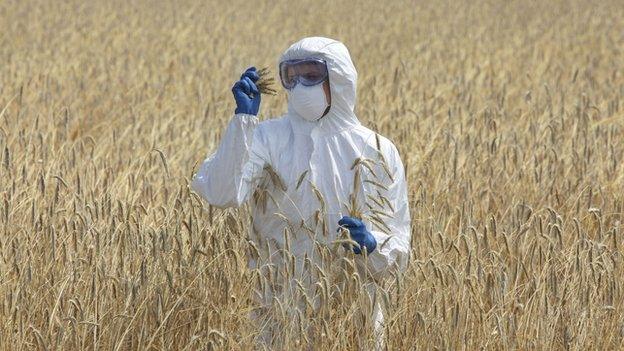
Campaigners fear large-scale agribusiness threatens smaller farmers who cannot compete
"We would like to see genetically modified organisms (GMOs) banned. Our maize seed sector is owned by just two companies: small players are being cut out and it's producing large volumes of very low quality food for South Africa.
"For small-scale farmers who have very little margin for risk, it's a very dangerous technology. It's extremely expensive, and it must be bought annually and farmers need to make sure they get good prices on the markets to service their debts and small-scale farmers don't have bargaining power.
"[The GM industrial model] has shown itself to be very dangerous, and if people have to buy their food every year and they don't have money, they starve.
"It's like trying to boil a pot of water on a nuclear reactor instead of building a fire; high-tech for its own sake.
"There's a bullying force emotionally blackmailing the world into believing that we need to adopt this technology if we're going to feed the world, but actually what it's creating is an ever bigger divide between the haves and have-nots.
"Perhaps if [GM technology] was within public institutions where there was more control and transparency, it could be useful. Unfortunately we see our governments just focusing on this technological solution when we need a much more nuanced discussion about the kind of food systems we want.
"There's plenty of research around what the problems are with GMOs in terms of democracy, safety issues, environmental impacts, socioeconomic issues, and that discussion has been going on for 30 or 40 years. It's a very sophisticated body of knowledge and work, so I think calling it 'irrational' is just a PR gimmick."

Calestous Juma: GM is an important tool
Calestous Juma directs the Harvard-based Agricultural Innovation in Africa project, which is funded by the Gates Foundation and supports the use of GM crops.
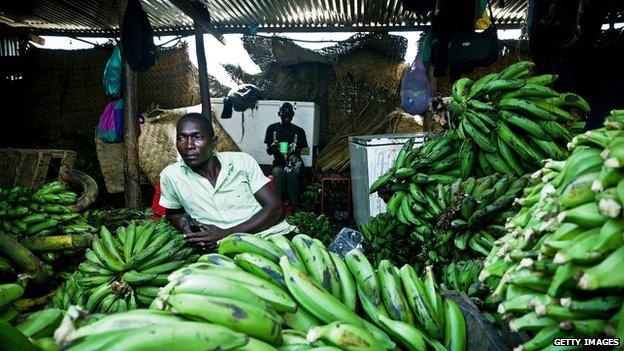
Ugandan scientists are trying to genetically modify bananas to resists a damaging bacterial disease
"In 30 years we'll have a population of nine billion people to feed and that will increase demand for the quantity and diversity of the food that we need - that's why we have to consider GM as one of the tools - but not the only tool - that would help humanity to address those challenges.
"[Opposition to GM is] not irrational. Farmers who are opposed to GM crops because they might have negative impacts on their income - you can say they are not being irrational. And then people who think that we are changing the environment in ways that are not predictable, they have reasons for doing that.
"[But] I think it's unhelpful because it's driven by present day observations, but does not take into account long-term considerations. I strongly believe that, as problems expand, you also expand your toolbox.
"I don't think that genetic engineering in itself embodies a particular farming system. Yes, it is true that the way the technology is developed initially could exclude some sections of the population, but the response is not to suppress the technology, it's to make other farmers have access to it.
"By defining this as a product of large corporations, you end up undermining local enterprises who have no connection whatsoever with large corporations. In fact the bulk of the biotech research that's carried out in African countries is funded by local governments and conducted by local researchers."
For example, one bacterial disease wipes out much of the Ugandan banana crop every year. The Gates Foundation funds local scientists' attempts to develop a new resistant variety:
"This is work done by Ugandan scientists themselves on a crop that has no connection with large corporations.
"They did not invent genetic modification but they have taken the techniques and applied them to solve a local problem - and yet there are organisations that are fighting it because it's genetically modified."
The Inquiry is broadcast on the BBC World Service on Tuesdays from 12:05 GMT/1305 BST. Listen online or download the podcast.
- Published24 April 2015
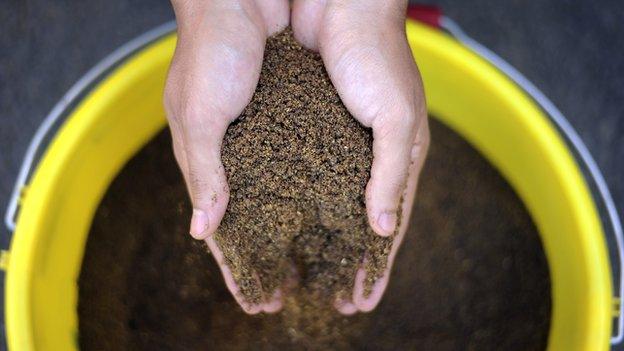
- Published26 February 2015
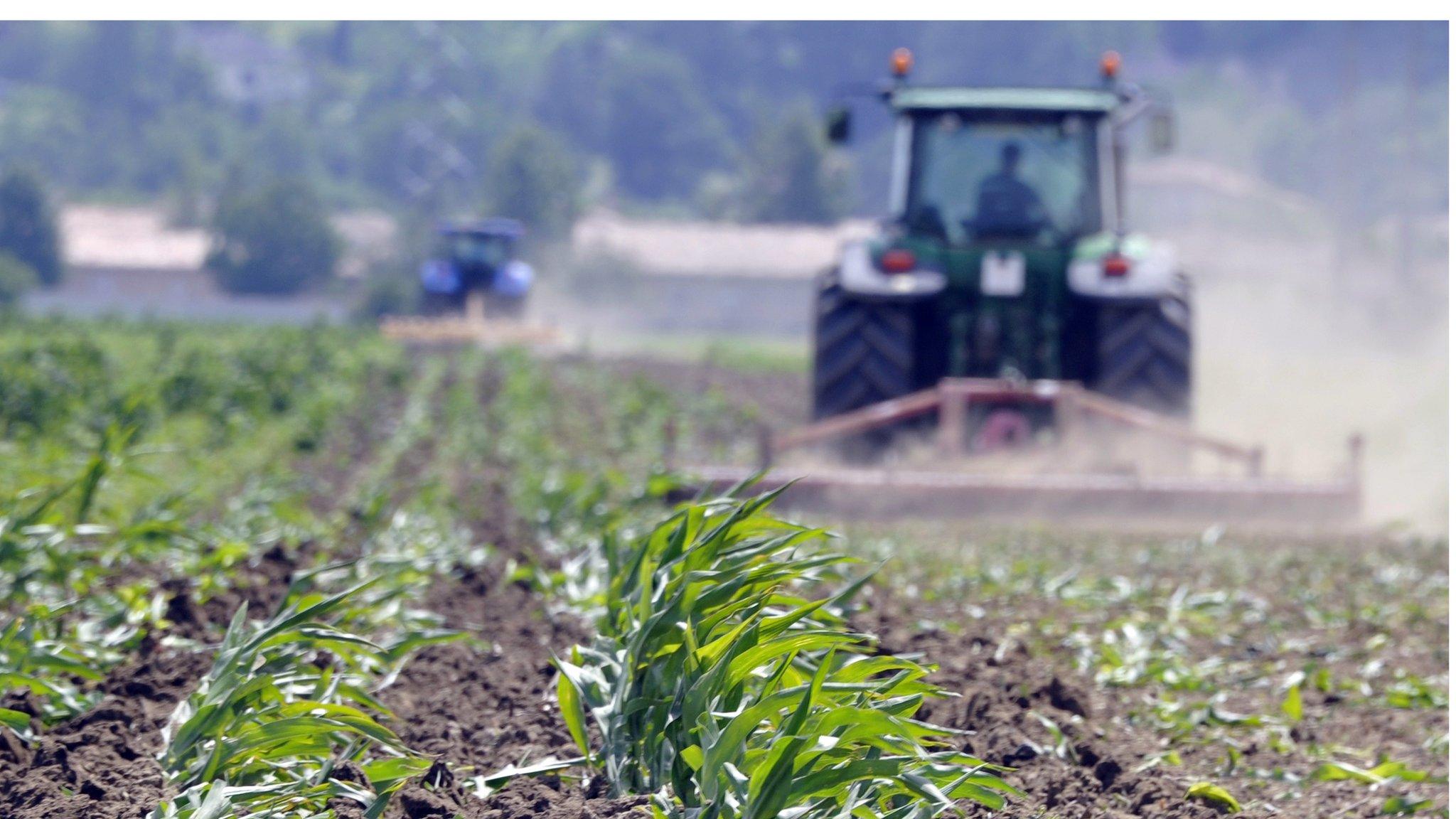
- Published4 February 2015
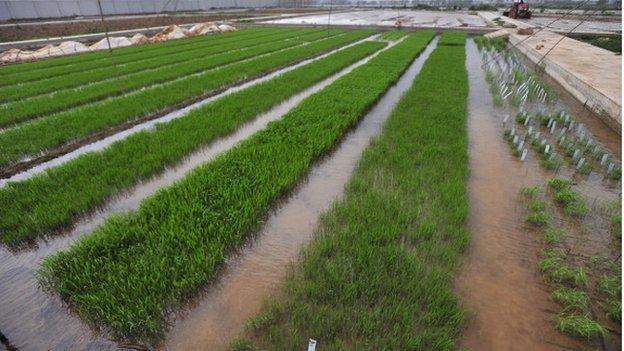
- Published2 February 2015
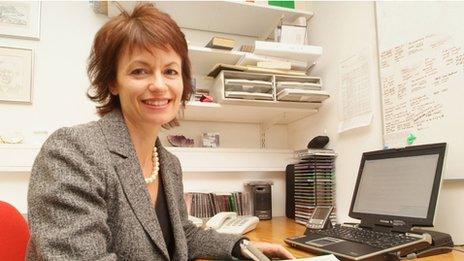
- Published14 January 2015
